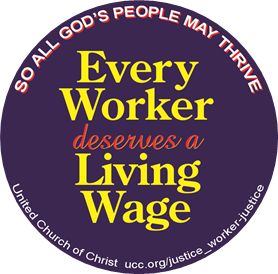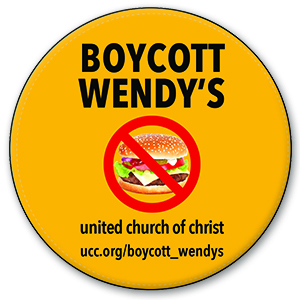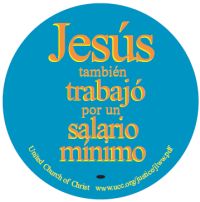Justice for Workers in their Workplaces
You shall not withhold the wages of poor and needy laborers, whether other Israelites or aliens who reside in your land in one of your towns –Deuteronomy 24:14
 We know that our loving God cares about all aspects of our lives, including our work lives. Conditions and events at work absorb our energy, occupy our minds, and impact our psyches when we are both at work and home. Our work situations can be fulfilling and empowering, or demeaning and humiliating. For many of us, our job is the main factor determining the size of our income, whether we have health insurance and a pension, whether we live in a big house or any house at all, and whether we send our children to college or to bed with an empty stomach.
We know that our loving God cares about all aspects of our lives, including our work lives. Conditions and events at work absorb our energy, occupy our minds, and impact our psyches when we are both at work and home. Our work situations can be fulfilling and empowering, or demeaning and humiliating. For many of us, our job is the main factor determining the size of our income, whether we have health insurance and a pension, whether we live in a big house or any house at all, and whether we send our children to college or to bed with an empty stomach.
| Low-wage workers across the country are courageously putting themselves and their jobs at risk by seeking better pay and working conditions. Locate worker organizations in your community that welcome your support. |
|
Additional Resources How the American South Drives the Low Wage Economy by Harold Meyerson, The American Prospect, Summer 2015. The low wages, no union jobs of the south are moving north. The Legislative Attack on American Wages and Labor Standards, 2011-2112 is a report by the Economic Policy Institute detailing numerous efforts to roll back worker protections, many of the efforts are sponsored by the American Legislative Exchange Council. Hard Work, Hard Lives by Oxfam America describes the difficult reality faced by millions of workers in the U.S. How Crowdworkers Became the Ghosts in the Digital Machine by Moshe Z. Marvit, The Nation, February 4, 2014. The exploitation of Amazon’s workforce. The Workers Who Bring You Black Friday: My life as a temp in California’s Inland Empire, the belly of the online shopping beast by Gabriel Thompson, The Nation, December 16, 2013. Among American workers, poll finds unprecedented anxiety about jobs, economy by Jim Tankersley and Scott Clement, Washington Post, November 25, 2013. Serving up justice: the movement for restauant workers’ rights heats up. The Nation, Sept 2/9, 2013 In New Wave of Walkouts, Fast-Food Strikers Gain Momentum, August 29, 2013. A Day’s Strike Seeks to Raise Fast-Food Pay by Steven Greenhouse, New York Times, July 31, 2013. Fast-food employees across the country engage in brief strikes in an effort to boost their pay. Fighting Back Against Wretched Wages by Steven Greenhouse, New York Times, July 27, 2013. Workers are organizing for better pay and working conditions; employers push back. Alt Labor by Josh Eidelson, The American Prospect, January 29, 2013. |
Some workers confront particularly unjust situations such as extremely low pay, unsafe conditions, racism, or sexism. All workers, whatever their position in the hierarchy of jobs, may suffer from indignities, large and small, that cripple their spirit and hinder their journey to greater wholeness.
One-quarter of all jobs in the U.S. pay wages so low that a full-time worker cannot keep a family out of poverty. For some, the biggest problem is no job at all. Even when the economy is considered to be “strong,” millions of people who want to work cannot find a job or can only find a part-time one.
God’s reign does not stop at the door to the workplace. The Church, the body of Christ, is called to seek out and accompany people wherever they are. So the church must also be in our offices, factories, stores, farms, schools, and all the places where people work.
![]()
Every worker deserves a living wage. We must raise the minimum wage and ensure that every job pays a living wage.
![]()
Labor unions are an important way that workers can improve their wages and working condtions, and gain greater dignity on the job. Traditional labor unions continue to organize and struggle to improve workers’ lives. But forming a traditional union is nearly impossible in the current political and legal climate, even though the right to do so is an internationally-recognized human right. So workers are creating alternative worker organization. For an overview see Alt-Labor by Josh Eidelson in the February 2013 issue of The American Prospect; the article describes and tells the stories of some of these alternative labor organizations and the couragous workers who are behind them. These groups, which welcome our supprt, are active in multiple locations around the country. Please find one near you and lend your support to strengthen their efforts.
![]() Women continue to be paid less than men for doing similar work. We need pay equity.
Women continue to be paid less than men for doing similar work. We need pay equity.
![]()
Young workers face special challenges: higher rates of unemployment and falling wages over the last decade for those with high school diplomas and college degrees.
![]() Safety on the Job is critical for all workers.
Safety on the Job is critical for all workers.
![]()
Labor Sunday, the Sunday of Labor Day weekend, is an excellent time for congregations to lift up workers and issues of justice in the workplace.
![]()
Economic globalization is impacting workers, jobs, and the U.S. economy. How do we respond?
![]()
Immigration is an issue surrounded with much misunderstanding and confusion. Don’t Be Fooled: Immigration is NOT the Real Problem explains that the shortage of good jobs in the U.S. is not due to immigration but lax enforcement of worker protections in the workplace.
![]()
Labor trafficking, also called modern-day slavery, refers to the use of force, coercion, fraud, or abduction to exploit a person for profit.
![]()
Work to end wage theft, the illegal practice of paying workers less than they earn.
![]()
Abusive sweatshop working conditions, either in the U.S. or abroad, must be eliminated.
Low-paying jobs are too common in the U.S. today
Some 28% of jobs in the U.S.(over one in four) pay poverty-level wages, so low that a full-time worker cannot support a family above our nation’s extremely meager poverty line. A job should lift everyone out of poverty, not keep them there. Poverty jobs can be changed into life-enhancing jobs if we work to make this happen.
Jesus was a Low-Wage Worker is a resource describing low-wage work, the workers in these jobs, and how we can make low-wage jobs into living-wage ones. All workers are made in God’s image and deserve living wages and respect. Request free buttons in English and Spanish (see image, bottom of page) from Annie at congresa@ucc.org or 866-822-8224, ext 3720.
In addition to low pay, low-wage jobs often have other disadvantages:
• few benefits such as health insurance, a pension or retirement plan, or paid sick leave;
• inconvenient hours such as nights, weekends, rotating shifts, or part-time hours;
• few opportunities for advancement; and
• too often, exceptionally dirty or hazardous work.
Women and people of color are more likely to hold these jobs than white males.
There are many types of low-wage jobs. They can be found in any industry or occupation. Some of the more common low-wage jobs are in health care (nursing homes, cleaning hospitals), hospitality (cleaning hotel rooms), restaurants and fast food, child care including early childhood education, farm work, meatpacking and poultry processing, retail sales, and security guard. Many of these industries are growing rapidly which means the number of low-wage jobs will grow in the future.
Note that much of this work cannot be moved overseas. The jobs performed by these workers — cleaning, caring for children and elders, selling items to customers — need to be done in our local communities. If people of faith stand with low-wage workers who are seeking to improve their wages and working conditions, then poverty-wage jobs can be changed into living-wage jobs.
The UCC’s General Synod Resolution Affirming Democratic Principles in an Emerging Global Economy (General Synod 21, 1997)

|
|

|

